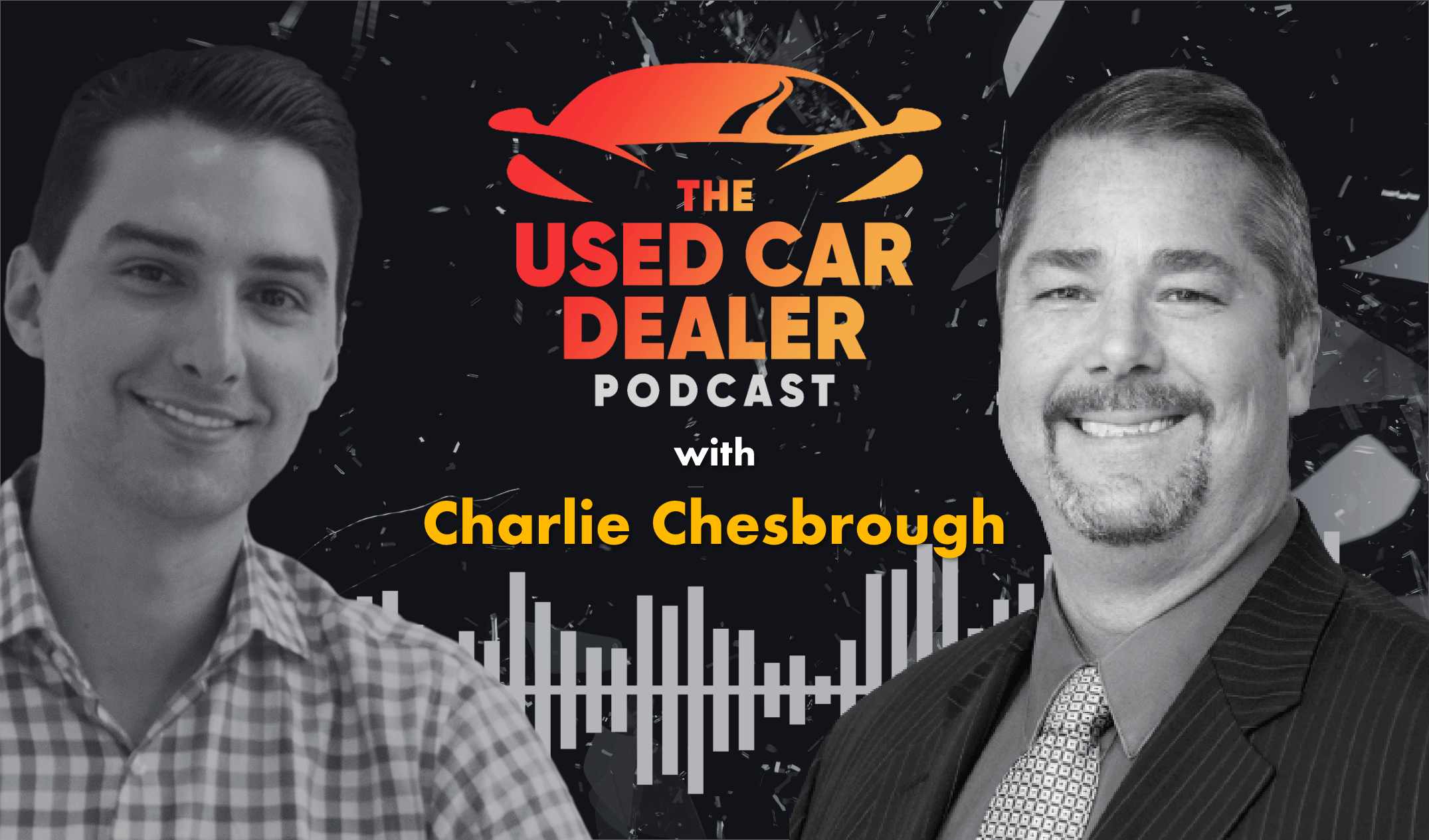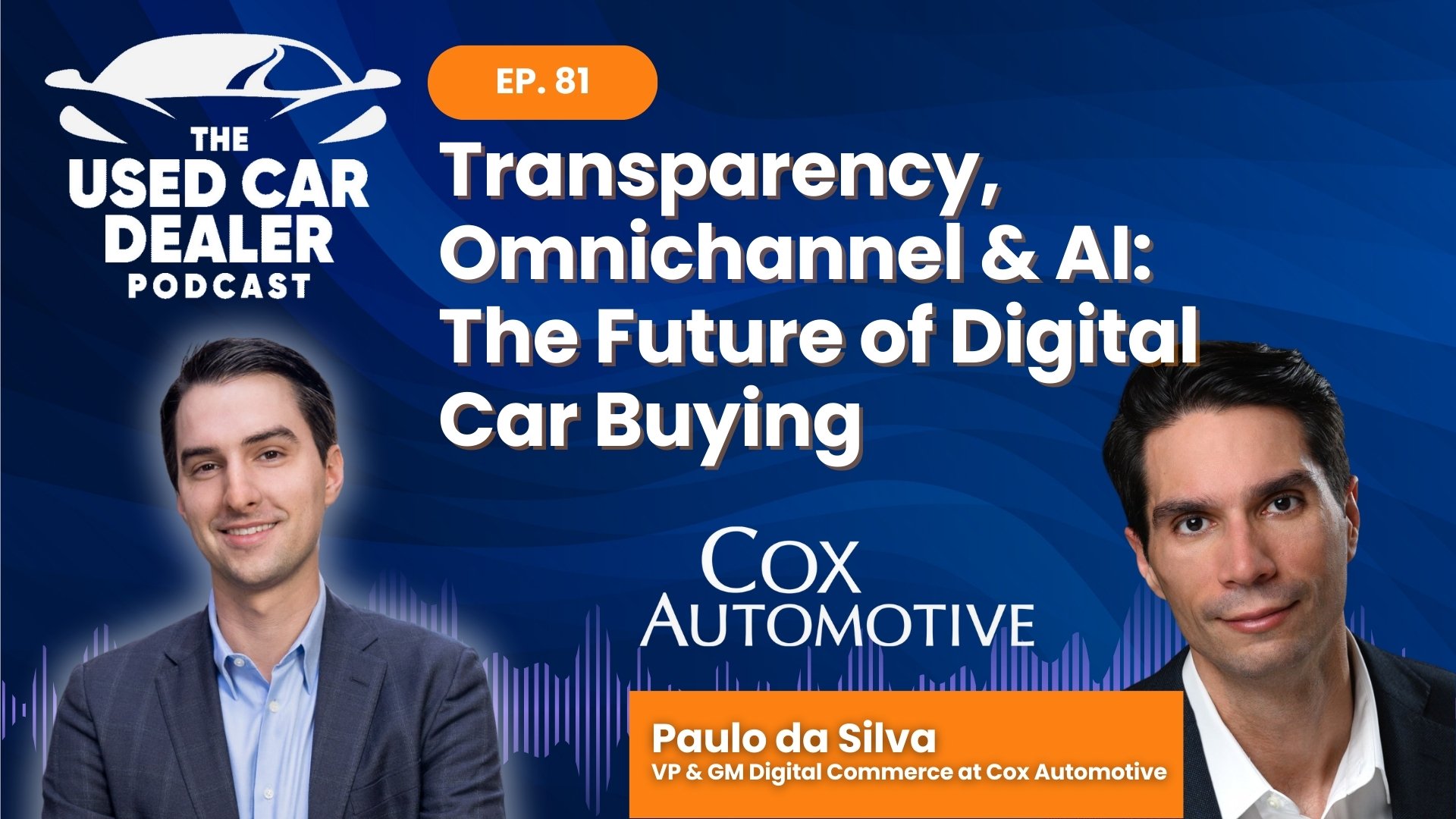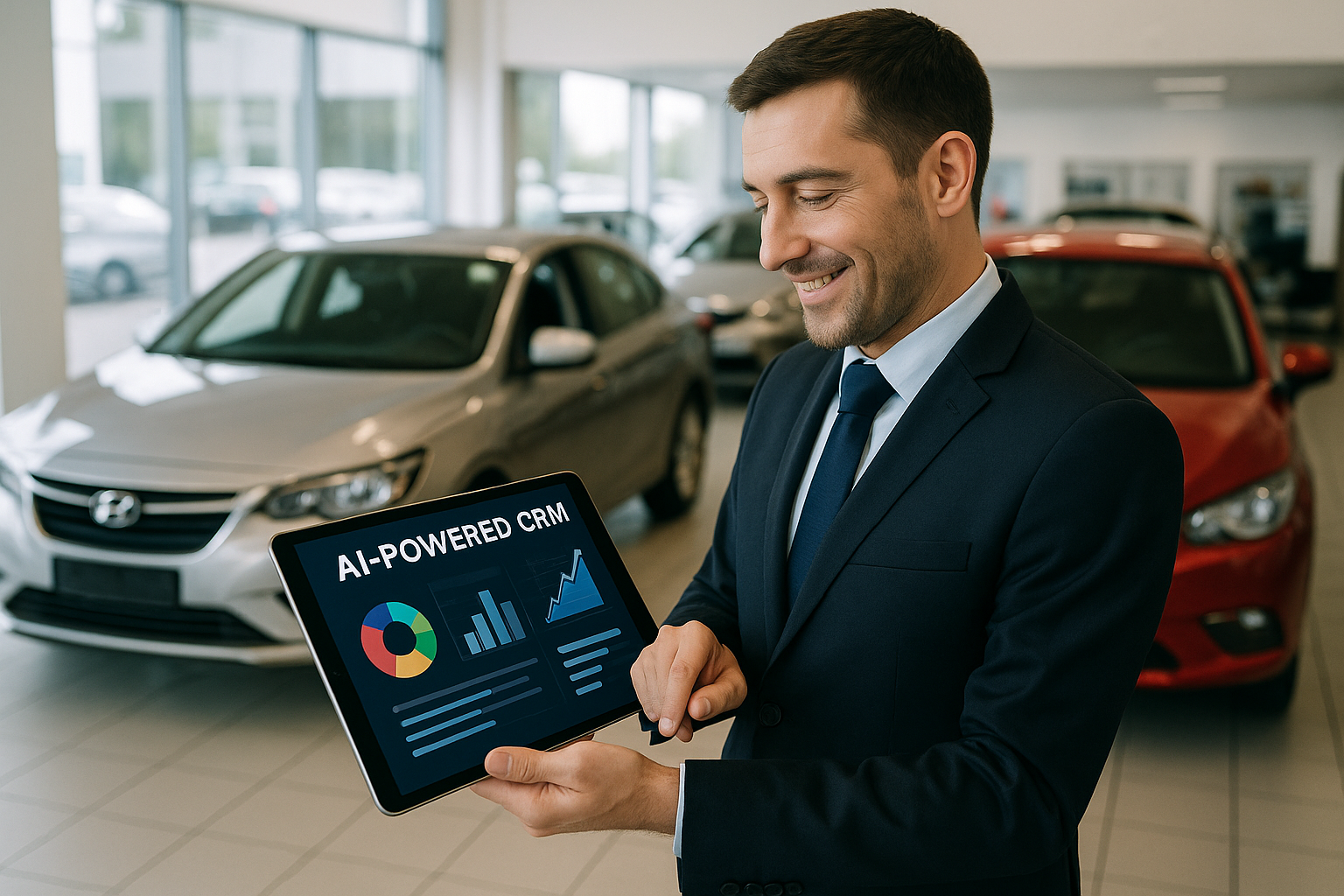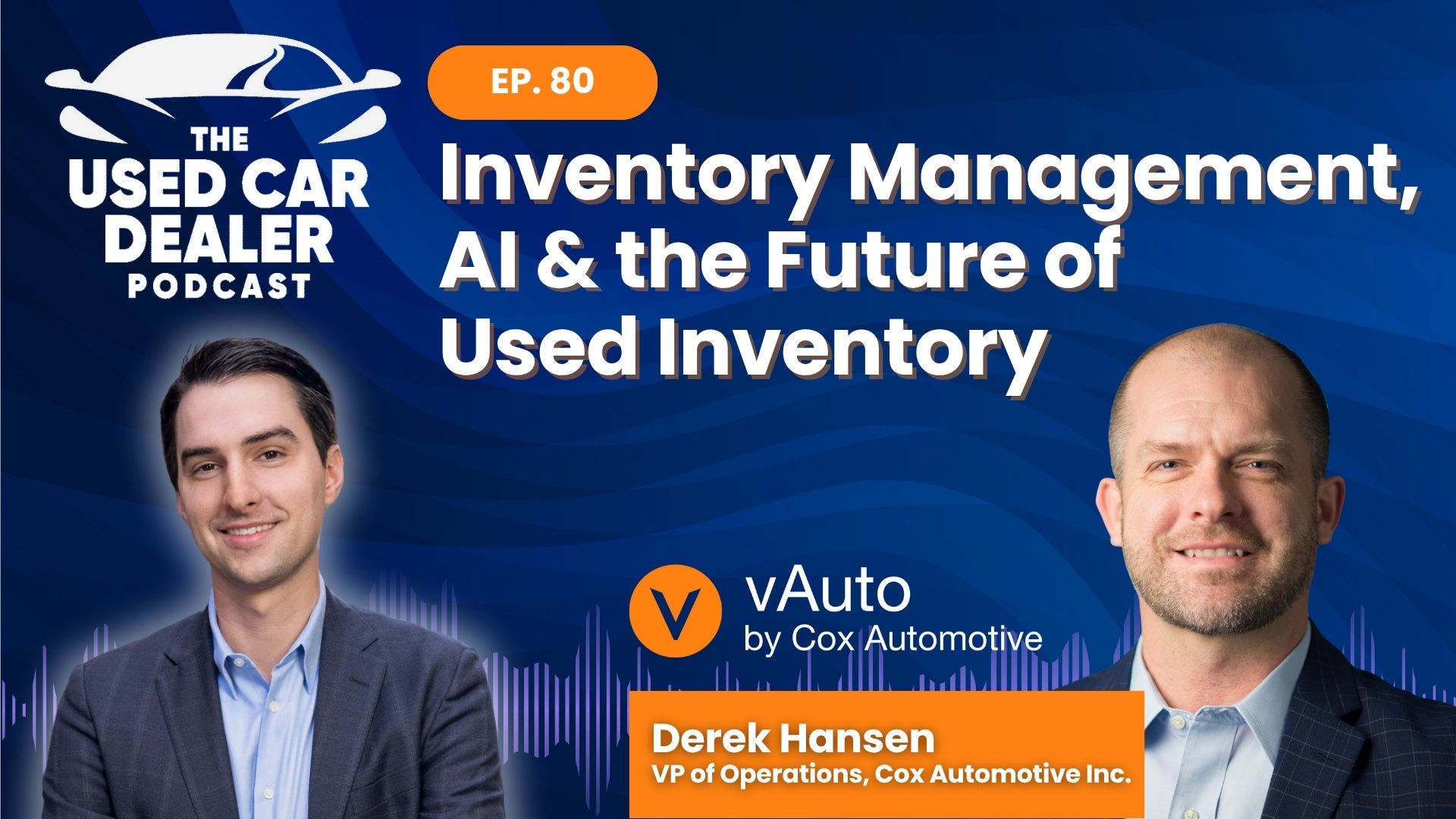In this blog post, we have transcribed the UCDP interview with Charlie Chesbrough in written format. You can listen to the original podcast here.
Zach: Well, hello everyone, it’s the Used Car Dealer podcast episode 15. This is Zach here, and we have a great guest today, Charlie Chesbrough, he’s the Senior Economist at Cox Automotive. Charlie, thank you so much for coming on the Used Car Dealer podcast today. How are you doing?
Charlie: I’m doing well, thanks for having me.
Zach: Great, and for those listening. They might be wondering, what exactly does an economist do at Cox Automotive and how do you become an automotive-focused economist?
Charlie: Well boy, what one does at Cox Automotive is, I’m involved a lot with our economics team, we have a whole industry insights team that’s focused on looking at how does the broader economic impact the automotive market for both new vehicles, as well as used vehicles and what does all of that mean for our internal clients, with our long term planning and strategy groups as well as for our clients. So what it may mean in terms of their product portfolios to their own strategies that they may have going on.
So we monitor the marketplace, we monitor the vehicle marketplaces, we develop forecasts as to where we think the industry is going and sales and certain different segments of the market, and then we try to tell stories to our clients internally and externally as to what we see going on in the marketplace, and how we can help essentially help them better understand what the metrics are telling us in the marketplace.
And then how do we get here? Well, you gotta go to a lot of schools. I went to Michigan State for Economics a long time ago, and then the University of Illinois in Chicago for my master’s degree in Economics. I’ve been working for a number of companies as an automotive economist since then. I spent some time at Ford and IHS and I’ve been with Cox Automotive for a number of years. And the exciting thing about Cox is that we are relatively a big player in the automotive industry, that a lot of folks don't really know about.
I‘m based in the Detroit area and I would say that Cox automotive isn’t that well-known up here. But we are involved in almost every aspect of the automotive industry. Once that vehicle is made and we have our hands the ability to look at all kinds of really interesting data on what’s going on at both new and used markets.
Zach: And what’s been your view of the dramatic changes in the economy from like COVID-19 when it kind of first started in America around March, to where we are today in terms of the Auto industry.
Charlie: Well boy, we could spend the whole show in just that question. I mean that we’ve seen so many moving parts since all of this started to happen around mid-March. I guess one of the interesting things that we saw in the data is massive changes in vehicle sales across the country. We could really monitor the geographical implications of the COVID shutdowns, and clearly, you could see those governors shutting down the markets in the East Coast as well as in California and the state of Washington. The dealers were unable to even sell vehicles in many markets.
And so we saw huge drops in retail activity. And as a result of that, the markets that were open at that time in the South and the Southeast part of the country, they saw massive increases in their market share and their share of the industry’s activity.
But then once the governors reopened these markets later in April and early May. We saw a complete reversal of these markets that were closed before and now started to really sell like crazy as vehicle sales took off and the markets that were open actually saw sales kind of stagnant a bit and the COVID virus started to have some implication for them.
So, we’ve been seeing that real changes in sort of manufacturers sales and product sales around the country, well behind the scenes of everything that we’re looking at, these geographical shocks that we've had to the marketplace because of government policy as well as this virus have really been changing things quite a bit.
So that’s one of the interesting things that we’ve been seeing as a result of this virus but in terms of what we’ve seen in the market more recently as I think everyone has been very, very surprised at how quickly the vehicle sales have come back. And I know at the very early stages of all of this, so I saw the job losses that were piling up in April and into May and over the summer, we were all like, oh my gosh, this is gonna be a really massive economic hit, vehicle sales are just gonna, you know, drop out.
What we saw rather quickly that once vehicle sales were allowed to be sold again in probably around the month of May, we were starting to see the numbers improve. Retail sales actually came back quite strongly and consumers I mean on an annualized basis, retail sales in both new and used really down just a little bit.
And it was really surprising to see that consumers were so eager to get their hands on vehicles even in the depths of the recession in the virus itself and I think that says a lot about the product, you know. People really need transportation, they want transportation. Maybe in the pandemic, we’ve learned that vehicles become a necessary good rather than sort of a luxury good or a “nice to have” good and so I think that’s one of the things that we’ve maybe seen during this pandemic but we also know that the government stimulus of a couple trillion dollars that was injected into the economy certainly had a huge implication for our industry in helping to get vehicles sales back on track.
And that’s one of our concerns while here into the 4th quarter here is that that stimulus happened a long time ago now and it’s not looking good for us to get in another one and so this economy could stall, that’s one of the things we’re concerned about
Zach: And talk to me about the interest rates cause now we’re seeing like 84-month terms and things that we weren't seeing previously kind of in the stimulus-driven Corona economy if you will.
Charlie: Yeah, that’s one of the things that we’ve seen in terms of a strategy that was employed when this pandemic hit, is a lot of manufacturers went into low-interest rate financing. Zero percent offers were thrown out there in late March and into April and we also saw the introduction of the 84-month financing and that really is a relatively new term, you know that we haven't had here in the US market before, you know, 7 years on a loan.
It’s fairly popular up in Canada. I’ve heard some in the neighborhood of a third or thirty percent of retail activity does have these long loan terms. That may be one of the things we see emerge from this pandemic is that long loan terms become much more popular.
You know at 72, 84 months and who knows, maybe we’re going to see even longer as the vehicle quality improves in the coming years but that’s certainly been one of the factors that has been a big plus I think for vehicle sales during the depths of this pandemic is that the move to this 84-month terms allowed monthly payments to make a huge downward shift, you know. You were able to knock a big chunk off of monthly payment.
If you were--if you had a loan, you know, paying just a small percentage rate for 72 months all of a sudden you could get zero for 84, you could deduct a 100 dollars of your monthly payment very easily and end up with a brand new vehicle. And so I think that was sort of a real shock that did inject something in the market but we’ve seen manufacturers, in general, have backed away a little bit from those aggressive offers in the early days, but certainly interest rates, long terms, as well as the interest rates, certainly did have an impact on the market. I think we’re gonna see more of that and continue going forward as well.
Zach: And are they doing 84 months on both new and used inventory?
Charlie: No, not used you know generally I would say in the used market you’re looking at a max of a four-year loan, you know maybe some fives but no, in the new market is where you’re gonna get very long loan terms.
Zach: So, we’ve heard from some dealers that there are consumers who are not, you know, paying their monthly car notes, like, what have you seen from the lens of an economist in terms of consumers and repo rates or, you know, failure to pay their car notes.
Charlie: Yeah that was certainly one of the early concerns that we had when all of this was hitting the fan back in March was, well boy, a lot of folks are out of work, you know 30-40 million people instantly unemployed, that’s a lot of car payments that aren’t gonna get made.
But we really haven't seen that spike in the data just yet. We are starting to see maybe a little bit of you know as we get further out from that loan package but a lot of the actions that Congress took in the early days of this virus with the big bailouts and extending unemployment benefits and increasing unemployment benefits, as well as accommodations made by many banks and lenders to help folks, kind of keep their vehicles, keep their homes. all of that activity, we think has been successful in sort of keeping repos from getting out of hand.
But, again as we start getting into this 4th quarter, that is one of the items that we’re gonna be watching is that do we see that. The other interesting thing we’re seeing the data is that interest rates for lower fico score credit customers, your subprime borrowers have actually been going up, even though we’ve seen other interest rates going down and the subprime share of the market has been declining quite a bit in recent months. So the market’s kind of moving a little bit further away from affordability at least for those at are on the margins of their credit quality
Zach: And correct me if I’m wrong but this year is the first year since World War II where new car auto manufacturers have stopped production for a period of time and that’s had an impact on the 2020 models, any commentary around that halt in production earlier in the year and its impact on the automotive ecosystem?
Charlie: Yeah, it’s created one of the issues that the industry is dealing with now, which is a shortage of inventory. And essentially the factories in North America, if not the factory itself the supply chain to it--everything pretty much came to a halt, for the months of April and much of May and the industry got behind about 3.3 million units I think or somewhere in that neighborhood in terms of production for those 2 months that not much was getting done.
And yet vehicle sales as I mentioned before were actually coming back fairly strongly and the shelves got picked bare. And you know, they were selling the vehicles more quickly than they could get them back in and now we’re in the situation where the industry does have relatively a weekday supply certainly below levels we were at this period last year and you know one of the concerns we had again going into the fourth quarter is--do dealers have the right inventory, you know, the right color, the right trim package that everybody wants or have things been deteriorated in terms of product availability that it may cause some customers to wait if they can’t get exactly what they want.
And then the other question we have essentially the whole model year roll-over process. Generally in the Fall is when we begin the process of getting rid of the old products and introducing the new products. This year the old 2020s we want to get rid of them all, we want to start introducing the model year 2021s in exchange, you know companies introduce the products all year long now but there is still an emphasis sort of to do that here in the Fall. And where it’s not seen is that there’s not as near as many model year 2021s in the market this year is we had 2020s last year, and so there’s not as much new product out there as well.
And so the 4th quarter is a big period for the luxury market, we know a lot of folks come out looking for a new lease, ‘cause there’s a lot of luxury leasing that occurs during that period. It may be that there’s not gonna be a whole lot of model year 2021s, the very latest and greatest product out there for consumers, and that may be a bit surprising for many shoppers out there.
Again, we don’t know whether that's gonna hold back vehicle sales but it would suggest it’s just another headwind that the industry has to deal with but we see that this inventory situation is likely to continue through much of the 4th quarter thus far it doesn’t appear to be holding back vehicle sales, they still seem to be doing you know quite well but it just does add another layer of complication for an already complicated market
Zach: And what’s been the impact on lease returns I know like for a point in time it might've not even been possible for consumers to return their lease for instance if they were in a state where their dealership was not operating due to the corona pandemic restrictions, what did you see in that area?
Charlie: Well we did see a period early on that there was quite a bit of concern in the early days of the pandemic that these lease returns were gonna come back and nobody wanted these vehicles.
Everyone was in a state of shock like, don’t bring back your off-lease vehicle cause I don’t want that, I can’t take it, you know, the industry was really kinda apprehensive about what to do with these vehicles cause the whole market kinda come to a halt for a few days and there’s a lot of panic around that.
And a lot of manufacturers, in order to kinda mitigate that risk, were asking many folks to just keep their vehicles for a few extra months, you know, don’t bring that off-lease vehicle just yet. But that’s kinda moved past--we’ve kinda moved past that stage so we’re back in sort of the normal off-lease program. The Fall again, as I’ve mentioned before is a big period for many folks when their leases do expire and they’re coming back to renew that lease, you know.
Our expectation is that your leasing down on a year-over-year basis but that customer segment, the people who do lease a new vehicle, they’re probably not suffering too badly as a result of this recession. They’re generally a higher-income person, higher credit score person and our guess is that they haven't been in the crosshairs of the job losses of this recession. So that we may see, sort of, this off lease activity in Q4 actually do quite well just because those customers in large part have held up well.
Zach: So, this summer we saw basically peak wholesale pricing. We were hearing from dealers they in some cases the price of a used vehicle might be very close to what that new counterpart was and I’m curious what sort of anecdotes or interesting observations did you have this summer in this used car frenzy and when wholesale pricing was higher than ever before
Charlie: Yeah, well I think in a lot of that can be attributed again to that stimulus spending that we got from the government, that extra money that was injected into the economy. A lot of folks said you know what I wanna go out and get some new wheels.
And we know that the new vehicle market has--I don't wanna say abandoned--but they have certainly backed away from the lower-priced products on the new vehicle side and there really isn't a lot to shop for under $30,000 anymore in the new product side particularly if you’re looking for a crossover.
And so there’s just a lot more to choose from on the used side and I think we saw sort of in the early days of the recovery period that people realize what a whole buffet of vehicles to choose from in the used market and all stuff that I can afford I mean, it’s all sort of in that affordability range, you know in that $20,000-ish area.
And so I think we just saw a lot of activity and it was really quite interesting to see the vehicle prices take off so rapidly and we know that we heard great stories from dealers that it was a very profitable summer and that they did very, very well but I will say that we kinda see going forward that it’s gonna be more of a challenge that the inventory levels have been drawn down quite a bit on the used vehicle side, there’s just not quite as many of these as there was before.
A lot of the normal supply to the used vehicle market of fleet companies kind of rejuvenating their fleets and sort of getting rid of old products and getting new product from the new vehicle market, the investment put on hold, people trading in their new vehicle or their old vehicle to get a new vehicle, that's been kinda slowed down as well as repossessions and all of that as I mentioned before also being delayed.
So we are seeing that there isn’t a whole lot of new used supply and so those inventories have been drawn down but demand does remain quite high and we’re seeing vehicle prices out there still remaining very, very elevated in the used vehicle market. But our guess is that that’s gonna start to change as well as the supply kinda comes down, as well as when we get into the late stages of this pandemic and the stimulus checks that we got.
If we don’t get that other stimulus check from the government here in the 4th quarter which Congress has been debating here recent days, that could have a big impact on these used vehicle sales ‘cause folks just aren't gonna have the money to continue the great run that we’ve had so far.
Zach: So, what does Economic outlook look like from the automotive perspective as we finish out 2020 and into early 2021?
Charlie: Well boy, it just seems like there’s gonna be a lot of uncertainty in and that’s the one thing that we’re certain of I guess. Yeah, I guess it’s the old Boy Scout adage you know, “Hope for the best, plan for the worst”.
You know at this point the economy has, I think everybody feels like it’s held up very very well, the economy has come back from an incredible shock but it’s now settling in down and about at, you know, 80 percent economy, you know, it's not back to where it was before and it seems unlikely that the economy’s gonna get back to 100% levels until we figure out something about this virus.
It’s just gonna keep everything a little bit suppressed. And so that’s a new reality that I think folks are gonna have to adjust to and so as we go forward, I think that it’s gonna be a little bit of malaise for the market but our general guess is that we’re just gonna continue on the upward recovery path. It’s just gonna be a slow recovery, we’re not expecting to see a V-shaped market recovery where everything’s back to normal, you know in 2021. We think it's looking more 2023-ish, so we’re really gonna start talking about the market getting back to where we all hope it will be.
Zach: And what are your thoughts on some of these new models like for instance, online used car dealers or online auto auctions?
Charlie: Well you know, I think anything that’s focused on digital activity is probably doing fairly well during this pandemic and I think if there’s any kind of lesson that we could take out of the pandemic is that, it does seem like dealers have been focused on digital transactions, more focused on sales whereas much of the transactions can be done digitally and not as much face to face contact with consumers. I think that is something that was relatively new for the industry and I think it's something that we’re gonna see much more of going forward.
So, you know all these digital online companies that, you know, I think online is where the industry is headed in every aspect, in everything that we’re doing, which is always surprising to me cause I’m old school Detroit. You know I can’t imagine buying a vehicle without going out and kicking the tires but consumers are getting more and more comfortable with that, so I think that’s a trend that we’re gonna see continue.
Zach: And, what are your thoughts on used car leasing and subscription model where it’s more like month-to-month versus like a traditional 24-month or 36-month lease?
Charlie: I think there’s gonna be a lot of opportunity in the subscription you know if someone can kinda crack that code and figure out how to make it work, really the basic premise is that a dealer or some company or individual could buy that vehicle at a much lower interest rate then the customer that they would be subscribing to could possibly get. And you know there’s a large portion of the market out there that’s paying double-digit interest rates when they buy a vehicle, you know.
If the dealer for example could finance a 3- or 5-year old vehicle at a 3 or 4 percent interest rate and be subscribing that out to folks who would normally pay a 15 percent interest rate, there’s gotta be a way to capture that margin, know the cost savings that there may be for, you know, providing service of that vehicle within the dealership and the ability to you know sell that vehicle whenever it's necessary.
I think that there's a real opportunity in subscriptions. I think that that’s an area we’re gonna hear much more about here in the coming years. Particularly given the price of vehicles these days, I think it’s just gonna get more and more expensive and we’re gonna have to come up with creative ways to help folks figure out how to afford these vehicles.
Zach: And, my last question and this is more kind of the futures type question, what excites you, whether it's something that Cox Automotive is working on, something that you’re seeing trend-wise in the economy about the future ‘cause we’ve been talking about Corona so much and that’s kind of a downer for a lot of people, but what’s exciting that kind of coming down the pipeline in terms of innovation in the auto industry or kind of unique economic insights that you have?
Charlie: Yeah, well if I had to choose one, it might be an obvious one but I think that the electrification that is coming I think is very, very exciting for the industry. And I know there’s a lot of doubting Thomases out there, I’m often including myself in them, that consumers are not gonna go for these electric vehicles, you know there’s no charging stations, you know, there a litany of things that you could come up with about why this isn't gonna work.
But I think the world is deciding that it’s gonna go there and I think we as a country have to figure out that at least we have a large portion of our fleet that way or else we’re just not gonna be participating in with the rest of the world and I think that limits our ability to sell products.
So, I think it's important that we do participate and I think when the products are gonna be coming here in the next couple years, Rivian’s gonna have products out here in 2021. You know Tesla’s an incredibly exciting company and there’s a whole bunch more of new electric companies that are coming.
It’s gonna be a lot of new and exciting products out there that consumers haven't seen before and you know for folks that are fans of cars and the whole history of the automotive industry, I think we’re about to enter one of the most exciting and innovative times that the industry has ever had in terms of the products that are gonna be coming here in the next couple of years
Zach: Well said and Charlie, I appreciate you so much for coming on the Used Car Dealer podcast today, and you’ve had some really interesting perspectives on the industry. Thank you so much.
Charlie: Well thanks for having me, happy to do it.



.png)




.jpg)
.jpg)
.jpg)
.jpg)

.png)
.png)
